Middle-Earth: Shadow of War Review
Awesome Awesome Game!!!!!!
God damn, Warner Bros., you couldn’t just release a game without finding a way to stuff microtransactions into it, could you? Before Shadow of War even hit stores shelves it was revealed that there would be purchasable loot crates, and understandably the Internet was not happy, especially since Warner Bros. had already announced different tiers of the game for you to buy on launch. Having played through the game I can at least confirm that they are optional, but at the same time they’ve clearly influenced the design as the end-game is a brutal slog in order to get a second ending that feels as though it was made with the sole intention of pushing players toward spending real cash. It’s a shame because these microtransactions cash a shadow (see what I did there, eh? EH!?) across what is otherwise a very fun title.
These purchasable boxes contain various Orcs for your army and bits of loot, so I’m happy to say that I went through the whole game without buying any and still managed to get quite a few legendary weapons and several legendary orcs. Once I hit that endgame grind, though, I felt as though I was being pushed toward buying an XP boost or grabbing some boxes to get through it.
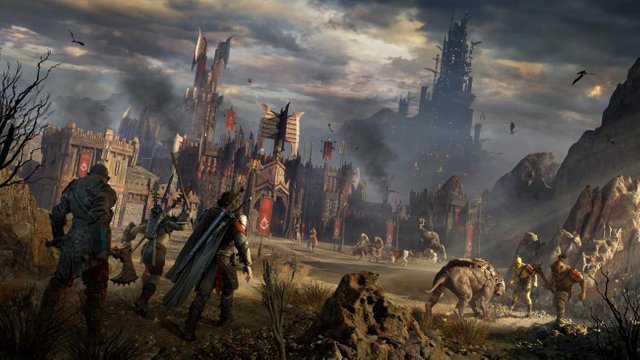
The highlight of the game is, of course, the evolution of the Nemesis system, something which in the prior game was used to craft named enemies for the player to fight, enemies who could taunt them with previous deaths and more. The basic idea was that if an Orc killed you it would become much more powerful, earn a name and gain the rank of Captain, taking its place in a living hierarchy that you could play around with. Various missions around that map that you could get involved in or ignore entirely would see the different Orcs grow in power, murder each other, become Warchiefs and more. It was an enthralling system that gave the impression of organically created rivalries, made all the better by Orcs who would taunt you based on your last demise, or who could come back from the dead in a sudden ambush with wounds matching what you did to them.
For Shadow of War the system remains pleasingly robust and fun to tamper with. Like before you can hunt down Intel to learn the weaknesses of the various Captains and Warchiefs in order to exploit them, as well as their strengths. Monolith has greatly expanded this area by quite a bit, so now Orcs can have special abilities, classes, a raft of bonuses like leading hunting packs and some strange traits, like one Orc I met who literally became enraged by everything or others who wear a lovely hat and speak in rhyme. There’s a satisfying feeling to be had from gaining intel on an orc and then using his weakness to decimate him, like taking advantage of a deadly fear of Caragors so that he flees in panic.
Like before you can dominate regular orcs to bring them to your side before activating them for some fun, but your options when it comes to Captains and Warchiefs are much more fun. A recruited Captain could act as your personal bodyguard, or even be sent into trials to prove himself as a bodyguard to a Warchief, ready to stab the Chief in the back at your command. You can also pit Captains against other Captains so that your Orc can grow in power, and personally intervening in those missions can help ensure success. Myself, I’m a big fan of dominating a Warchiefs bodyguards in order to spawn an ambush mission.
These upgrades to the whole system feed into the fact that you’re now playing the Middle-Earth equivalent of Pokemon go as you try to catch ’em all in order to build armies and conquer fortresses. There are four regions containing fortresses that you must capture, and to do so you need to gather an army by dominating Orc Captains and Warchiefs. Killing them almost seems like a waste until you realise that doing so grants you new equippable gear that bolsters your stats, so suddenly fighting an epic or even legendary Orc turns into a tricky decision about whether you want to chop his head off or add him to the collection.
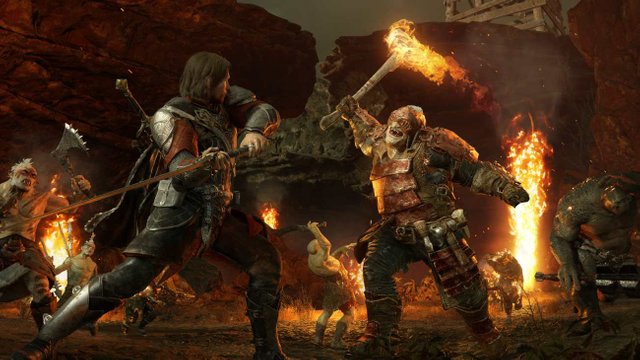
Yup, loot is a new inclusion so you can upgrade your armour, sword, ring, bow and more. There’s some pretty nice stuff to get your grubby hands on, and as a self-confessed loot-whore I found it a joy to finally get a legendary item. Throw in some unlockable upgrades for certain items and you’ve got a solid system, albeit one that perhaps feels as though it was included to help justify the lootboxs rather than because the game benefits from it.
Conquering a fortress means selecting up to six Orcs to lead the fight, and each of those can have a special siege bonus purchased for them that lets them bring things like a Caragor squad or poisonous siege beasts that hurl balls of death into the enemy encampment. When its time to attack you simply need to capture a few points before finally getting to face off against the Overlord in charge of the whole place in an underwhelming battle because up until that point you never see him, unlike all the other Orc captains and Warchiefs who roam the land.
Once a fortress is taken you can assign an Overlord of your choosing, and then the fighting pits unlock where you can send your Captains to do battle in a bid to level up or possibly get slaughtered, at which point you can go ahead and dominate the Orc who so cruelly killed your loyal soldier. I say loyal, but keep in mind it’s actually possible for a dominated Orc to betray you, which can almost feel like an emotional gut punch if it’s one you like.
For whatever reason, it’s possible to assault other players fortresses, which is why you would want to send Orcs to the fighting pit. This doesn’t actually effect each player’s bastion in single-player, but it does earn bonus loot. Again, though, there’s the overwhelming reason that this mode exists solely to tempt you into buying lootboxes that contain legendary Orcs that will be added to your ranks.
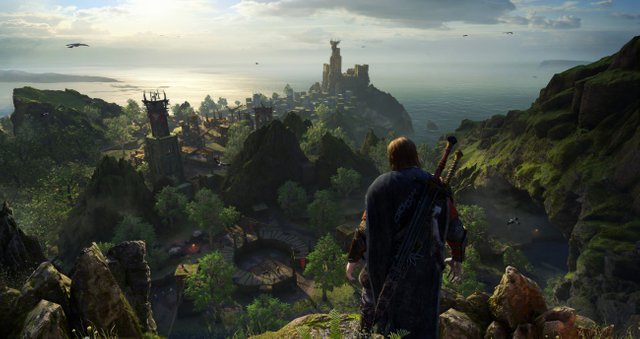
Sadly while taking a fortress should be a highlight and one of the game’s biggest moments they feel…lacklustre. Much of this comes down to the fact that Monolith seems intent on making you feel like the most badass badass who ever did badass. New movement options include things like a wraith-powered double jump, a blazing speed boost when sprinting and even massive upwards leaps when climbing, so now you don’t just walk into Mordor, you parkour into it like a f*cking madman on crack. Climbing, clambering and generally just getting around is smooth and a whole lot of fun when you’re going stealthy because it makes you feel like a predator picking off unwitting foes who really need to look up more often. The only hiccup is that since both sprint and parkour/jump/climb are all on the same button there were a few awkward moments.
Given the thousands of Orcs that are ambling around the various locations it’s no surprise that you’ll spend a lot of time fighting, and Monolith have opted to barely alter their original system which was heavily inspired by the combat in the Arkham series of games from Rocksteady. What this means is that you hammer away on X, use Y to counter incoming attacks, A to leap over troublesome opponents and B to briefly stun a target. Once you get into the rhythm it’s a pleasure, and it makes you feel like a genuine badass as you perform beautifully timed counters, leap over heads and hit the pleasing executions to thin the ground.
Like movement, though, you’re basically a super-hero capable of ripping through hordes of Orcs, and with some of the available upgrades that you can grab early-on you become a powerhouse. What this means is that capturing points in a fortress feels like something you could do on your own, making the acquisition of Orcs and the careful choosing of who to handle the attack feel a bit pointless. With that said, I was always rather methodical when it came to taking out Warchiefs in order to eliminate fortress defences.
Monolith also seems to have upped the amount of named Orcs you’ll face off against, which when coupled with the increased power that you wield means you’ll tear through their ranks with ease, very rarely getting a chance to develop proper nemesis like in Shadow of Mordor. This is why I personally recommend putting the game on the hardest difficulty setting, that way you might get killed more often and thus replicate the much more personal battles of the first game. Nothing gets you riled up quite like being ambushed by an Orc that’s killed you before and forced you to flee in a different encounter, but on the standard difficulty I only died at the hands of an Orc twice.
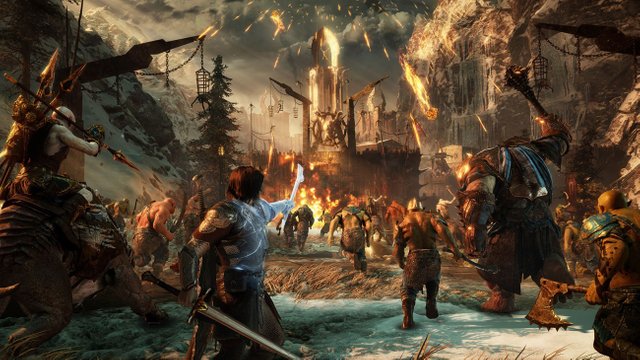
Stealth only emphasizes the feeling of being a predator capable of decimating entire legions of Orcs. The smoother, faster movement combined with the more than generous inability of guards to see you means you can run around encampments with impunity, merrily killing or dominating anyone who gets in your way. Your ghostly bow and the shadow strike ability that you can unlock only make you even more formidable.
In many ways, then, I think Monolith’s strong desire to create a sequel that has more and is bigger and more awesome has gotten carried away. It’s like they didn’t sit down to design a better sequel, just one that piles more stuff on top, like someone sat in the meeting and said, “well, let’s have MORE captains! And make the player MORE powerful! And have MORE regions!” I can’t really say this is a better game than Shadow of Mordor, then, at least not truly from a pure design perspective and not from a critical perspective. But what I can say is that Shadow of Mordor it’s a lot of fun. Sure, the repetition of hunting down captains, taking down chiefs and assault a fortress does the game no favours, and yet despite those clear problems it lulls you into a relaxed, almost hypnotic state where you just run around the open world murdering or dominating Orc captains like a deranged version of Pokemon. Maybe Monolith went too far with their desire for having more, but the core of the mechanics are slick and a joy to play around with. Cutting down Orcs in a huge brawl is a good laugh, as is systematically deconstructing an entire encampment through fast-paced stealth and savage execution kills.
The game comes alive when you swap over to the hardest difficulty because then fortress assaults are harder, planning attacks on Captains and Warchiefs matter and there’s a much higher chance of developing the seething hatred of an Orc that the Nemesis system was always supposed to create. I’m holding out hope that Monolith patch in a hardcore mode.
God, it’s just such a shame that everything great about Shadow of War is eclipsed by the absurd and frankly insulting desire of Warner Bros. to slap microtransactions into a game that was so clearly never designed to have them. The original Shadow of Mordor was a sleeper hit that didn’t have a huge budget and that’s why it worked, but here it’s obvious that Warner Bros. saw money to be made so they handed Monolith a bigger budget and then went to town with microtransactions and multiple versions of the game to purchase at launch as well, plus a season pass. Thankfully purchasing anything isn’t needed, although once you hit that final slog you might find yourself tempted.
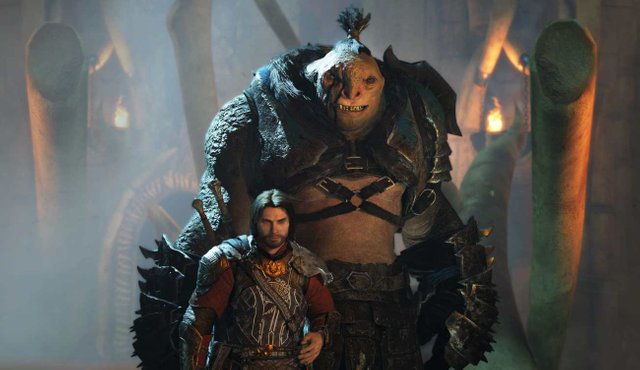
In other words, if you’re staunchly against the inclusion of microtransactions in full-price retail titles, especially single-player ones, then this is going to be an automatic skip for you, regardless of how much it is to actually play.
Thus far I’ve skirted around the story, focusing entirely on the gameplay because that’s where the game is strongest. Its story, much like in Shadow of Mordor, has some moments of greatness and a few good characters but ultimately is a forgettable experience that might just drive Lord of the Rings fans mad due to large liberties taken with the lore. The first is that of Shelob, the giant spider who in this game is capable of transforming into a woman who acts as a guide of sorts to the returning Talion and his wraith friend Calebrimbor. The reasoning behind this is that Shelob’s mother was a being capable of transforming into a giant spider, and thus Shelob is capable of the same thing as well as granting visions. According to the developers, they see her as a dark counter-point to Galadriel, and she is interested in Talion’s quest to defeat Sauron as well as the new ring of power he and Calebrimbor forged. If the mention of a new ring of power and Shelob transforming into a vision-giving sexy woman annoy you then it may be best to skip past the cutscenes, as the game even manages to reveal Nazgul’s identities as people who were not born until much later.
But there are some good moments, like Bruz the Orc who has a strangely Australian accent and doesn’t really fit in the Lord of the Rings universe but is still utterly awesome. It’s like you should go into the story as a sort of fan-fiction rather than something that should be taken too seriously. The more willing you are to accept it as something based in Tolkien’s world but ultimately it’s own thing the more enjoyment you’ll get out of it.
Man, what a ride reviewing this game has been. Under the stupidity of the microtransactions and the late-game slog lies something incredibly fun. Finding the coolest and rarest Orcs to recruit is a blast, the Nemesis system remains a joy to play around with and the core stealth and combat are great. Monolith has tried to pile too much into the game with the various gems, bits of loot, Captains and collectables all on top of the increased player power. At least you get value for money out of it, though. At the end of the day even though the included microtransactions don’t intrude too much but they do set a dangerous precedent that needs to be denied, lest it ruin gaming for us all.
So, I’m not giving this the recommended sticker. It’s too inconsistent for that. But I will say by ignoring the microtransctions and accepting the story for what it was I did have a blast playing Shadow of War, and found myself constantly going back to track down a few more Captains or to just play around with Nemesis system.
Source:
https://wolfsgamingblog.com/2017/10/21/middle-earth-shadow-of-war-review-shadow-of-greed/